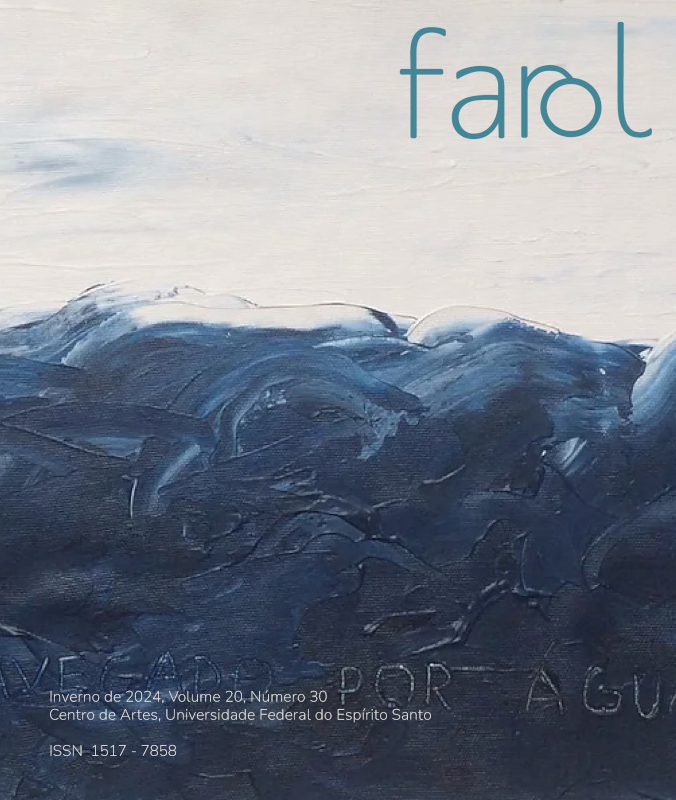Diálogos com povos tradicionais e diversidade cultural no XV Seminário Capixaba sobre o Ensino de Arte
DOI:
https://doi.org/10.47456/rf.v20i30.44134Palavras-chave:
Artes populares, Mestres de Saberes, Cultura TradicionalResumo
O presente artigo é inspirado na 2ª Conferência intitulada “Povos Originários”, realizada durante o XV Seminário Capixaba do Ensino da Arte, na Universidade Federal do Espírito Santo. “Diálogos urgentes” foi o título do seminário, para nomear a necessidade de se debater temas emergentes na contemporaneidade, como as questões relacionadas aos povos originários, e a necessidade de se estabelecer o diálogo com os sujeitos detentores de diferentes conhecimentos. Primeiro, destacamos o processo de transmissão de conhecimento na cultura tradicional, tendo como base um Ponto de Memória numa comunidade quilombola no norte do ES. Segundo comentamos a relevância das mulheres neste processo. Terceiro, examinamos articulações entre ensino-aprendizagem e cultura tradicional, no contexto das artes populares. Considerando os diálogos na Conferência, apontamos que o trabalho colaborativo junto aos mestres da cultura tradicional contribuiria com a inclusão da história e da cultura indígena, africana e afro-brasileira no ensino formal, em todos os níveis. Repercutimos a demanda pela inclusão de jovens indígenas e negros quilombolas nas escolas e universidades como princípio democrático do direito à vida, que passa pela inclusão da diversidade cultural nos debates nestes espaços.
Downloads
Referências
ARAÚJO, Janja. Mulheres negras e culturas tradicionais: memória e resistência. In:
Currículo sem Fronteiras, v. 19, n. 2, 2019, pp. 553-565.
CARVALHO, José Jorge. Sobre o Notório Saber dos mestres tradicionais nas instituições de ensino superior e de pesquisa. In . Cadernos de Inclusão 8. Instituto de Inclusão no Ensino Superior e na Pesquisa, INCT, Brasília, 2016.
COSTA, Renata Beatriz Rodrigues da. Um Nome a Zelar: histórias de uma Quilombola do Norte do Espírito Santo. Dissertação de mestrado. Centro de
Ciências Humanas e Naturais, Programa de Pós-Graduação em Ciências Sociais, Universidade Federal do Espírito Santo (UFES), 2018.
GOLTARA, Diogo Bonadiman. Dinâmicas comunitárias e espirituais: a rede esotérico-umbandista entre comunidades negras rurais às margens do Rio Itapemirim. In RURIS (Campinas, Online), Campinas, SP, v. 9, n. 1, 2015. Disponível em: <https://econtents.bc.unicamp.br>. Acesso em: 10 de Nov. 2023.
GUIMARÃES, Aissa Afonso; OLIVEIRA, Osvaldo Martins de. Jongos e Caxambus: culturas afro-brasileiras no Espírito Santo. PROEX:UFES, Vitória, 2018.
IPAC. Instituto do Patrimônio Artístico e Cultural da Bahia. Texto relativo à definição do Conceito Geral de “Patrimônio Imaterial”. Bahia: IPAC, 2000. Disponível em
. Acesso em: 15 de Nov. 2023.
OLIVEIRA, Osvaldo Martins de. “Quilombos: memória social e metáforas dos conflitos comunidades do Sapê do Norte, Espírito Santo”. In ALMEIDA, Alfredo Wagner Berno de (Orgs)... [et al]. Nova Cartografia Social: territórios quilombolas e conflitos. Manaus: Projeto Nova Cartografia Social da Amazônia,UEA Edições, 2010.
RODRIGUES, Luiz Henrique. Quilombolas e jongueiros: uma etnografia nas comunidades de Linharinho e Porto Grande, Conceição da Barra (ES). Dissertação de mestrado. Centro de Ciências Humanas e Naturais, Programa de Pós- Graduação em Ciências Sociais, Universidade Federal do Espírito Santo (UFES), 2016.
SILVA, Larissa de Albuquerque. De brincadeira a patrimônio: as várias dimensões do jongo/caxambu no Espírito Santo. In Anais Congresso Nacional de Ciências Sociais, Ufes, Vitória, Espírito Santo, 23 a 25 de set. de 2015.
SIQUEIRA, Jane Seviriano; OLIVEIRA, Osvaldo Martins de. O Jongo de São Benedito e o Samba do Tempo Antigo: uma análise das narrativas dos jongueiros da região norte do Espírito Santo. SINAIS, Vitória, v. 2, n. 1, 2018.
Downloads
Publicado
Como Citar
Edição
Seção
Licença
Copyright (c) 2024 Aissa Afonso Guimarães, Jane Seviriano Siqueira

Este trabalho está licenciado sob uma licença Creative Commons Attribution-NonCommercial-ShareAlike 4.0 International License.
Os autores de trabalhos submetidos à Revista Farol autorizam sua publicação em meio físico e eletrônico, unicamente para fins acadêmicos, podendo ser reproduzidos desde que citada a fonte. Os mesmos, atestam sua orignalidade, autoria e ineditismo.





